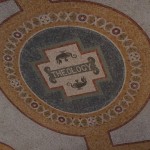We run our website the way we wished the whole internet worked: we provide high quality original content with no ads. We are funded solely by your direct support. Please consider supporting this project.
How should evangelicals “do” theology?
A central debate among evangelical theologians concerns the question of theological method. In other words, how should we “do” theology?
All evangelical Christians believe the Bible is God’s inspired revelation. Thus, evangelicals agree that Scripture must form the foundation for theological thought. But Scripture is not the only factor to consider when doing theology. Many evangelicals have adopted the Wesleyan quadrilateral (named after the eighteenth-century British revivalist and founder of Methodism, John Wesley) as a way to explain the various sources of theology and how they relate to each other. The quadrilateral, as the name suggests, presents theology as rooted in four sources: Scripture, Church tradition, reason, and experience. Scripture is viewed as the foundation of theology, with each of the other three aspects helping to clarify and interpret Scripture in a faithful manner for the purpose of doing theology.
The debate arises when the question is asked: How are we to balance the four aspects of the quadrilateral, and to what degree do tradition, reason, and experience shape and determine our understanding of the Bible? Although there is a spectrum of views on how to answer this question, two basic models can be described as follows.
According to the traditional evangelical model, the task of theology is to systematize and articulate the doctrinal truths found in the Bible. The emphasis is on the Bible as the unchanging, transcultural revelation of God. In the words of Carl F. H. Henry, “Divine revelation is the source of all truth, the truth of Christianity included…The task of Christian theology is to exhibit the content of biblical revelation as an orderly whole.” (C.Henry, God, Revelation, and Authority, vol. 1 [Waco: Word, 1976], 215). This view of the theological task is rooted in an understanding of the Bible known as propositionalism. For those who hold to a propositionalist understanding, the Bible is seen primarily as containing and offering information about God. In Henry’s words, “Scriptures contain a body of divinely given information actually expressed or capable of being expressed in propositions.”(Ibid., vol. 3, 457).
In contrast to the traditional view is the postfoundationalist evangelical model. Like other expressions of the postmodern perspective, the postfoundationalist approach emphasizes the culturally conditioned nature of all human intellectual enterprises—theology included. Simply put, the postfoundationalist method, while still recognizing the Bible as the primary theological norm, places greater emphasis on the way human reason and experience structure and shape any given theology. Stanley Grenz expresses this conviction when he writes that “the categories we employ in our theology are by necessity culturally and historically conditioned, and as theologians each of us is both ‘a child of the times’ and a communicator to those times.”(S. Grenz, Revisioning Evangelical Theology: A Fresh Agenda for the Twenty-first Century [IVP, 1993] 83).
While the fundamental Christian faith-commitment does not change, the conceptualization and articulation of this faith-commitment does change over time and across cultures. Thus, there is no expectation of ever arriving at a single evangelical “theology”; there will always be a number of diverse evangelical “theologies.” This is true both because God, the primary object of theology, is beyond any human system of thought, and because every human theological system will always be conditioned by its cultural context.
From a postfoundationalist perspective, the Bible is the inspired narrative of the saving acts and message of God. This means that the central locus of revelation is the narrative itself, not a set of propositions that can be distilled from and expressed outside of that narrative. The truths of God and his character are expressed in the unchanging story of Christian faith. A systematic theology, then, being necessarily and dramatically shaped by the components of human reason and experience, is always a culturally conditioned conceptualization and articulation of the implications of the unchanging biblical narrative for a particular people at a particular time and place.
For my part, I am convinced the traditional evangelical model of treating Scripture as a body of timeless truths is misguided. With the postfoundationalist camp, I see the Bible as an inspired narrative of God’s saving acts in history. But I am also wary of the postfoundationalist camp inasmuch as it can easily slip into a relativism that undermines the absoluteness of the truth claims of the Christian faith. Postfoundationalism can be interpreted to mean there is no foundation. In this case, people can never claim that the narrative (worldview) they choose to embrace and live by actually reflects the way things are. We can testify to the value the Christian story holds for us, but we cannot say it is more true than any other story.
I thus hold that Christian theology needs a foundation by which its truth claims can be anchored and assessed. Unlike the traditional evangelical model of Carl Henry, I do not see this foundation as being a body of revealed information. I rather see this foundation as being the historical witness to Jesus Christ as the definitive revelation of God. All theology is to be centered on Christ and epistemically anchored in historical considerations that ground the claim that he was, and is, the revelation of God to humanity. (On this, see P. Eddy and G. Boyd, The Jesus Legend [IVP, 2007]). The whole of the biblical narrative is centered on him and finds its legitimization in him.
Category: Essays
Tags: Essay, Theological Method, Theology
Topics: Theological Method
Related Reading

The Kingdom, Just War Theory, and Ukraine
History textbooks often read like surveys of how countries handled war with other nations. The stuff between the conflicts reads like precursors and aftermath to the history-making actions of war. Now we observe the rising tension between Russia and Ukraine along with other world leaders as they try to determine how to respond. Sadly, church history…

The Ultimate Criteria for Theology
Theology is thinking (logos) about God (theos). It is a good and necessary discipline, but only so long as it is centered on Christ. All of our speculation and debate about such things as God’s character, power, and glory must be done with our focus on Jesus Christ—more specifically, on the decisive act by which…

Christians and Politics: What are the different views?
How involved should Christians be in secular politics? Throughout history, Christians have embraced a number of different perspectives on this issue. These perspectives can basically be broken down into three groups. First, some Christians believe that one of the church’s jobs is to transform and ultimately control politics. This view has often been labeled the…

Is there Archeological Support for the Reliability of the Gospels?
One of the many tests historians typically submit documents to in accessing their historical reliability concerns the extent to which archeology supports or undermines the historic claims the document makes. So we need to investigate the extent to which archeology confirms, or refutes, aspects of the Gospels. Before we address this question, however, a preliminary…

The Evangelical Mind
Peter via Compfight As a follow-up to Rachel Held Evans’ thoughts yesterday on the Scandal of the Evangelical Heart, we thought we would post this reflection by Peter Enns about the Deeper Scandal of the Evangelical Mind. He claims that in the current environment when professors and pastors are constrained by the consequences of asking…

The Case for Women in Ministry
Kathy’s Struggle with Temptation Kathy was one of the brightest students I ever had when I taught Theology at Bethel University. She asked insightful questions and often contributed to lively class discussions. The time and energy she put into her theology classes was motivated by more than just a desire to get a good grade.…
